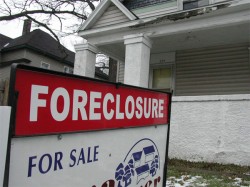 The Lawyers’ Committee for Better Housing’s (LCBH) 2012 Foreclosure Report, Housing Instability for Renters Continues: Chicago Responds with Adoption of New Tenant Protections, found that foreclosure filing rates on multi-unit buildings remained persistently high in 2012 and continue to have a significant and detrimental impact, displacing families, destabilizing communities, and driving the rapid loss of affordable rental stock in the City.
The Lawyers’ Committee for Better Housing’s (LCBH) 2012 Foreclosure Report, Housing Instability for Renters Continues: Chicago Responds with Adoption of New Tenant Protections, found that foreclosure filing rates on multi-unit buildings remained persistently high in 2012 and continue to have a significant and detrimental impact, displacing families, destabilizing communities, and driving the rapid loss of affordable rental stock in the City.
LCBH has been compiling foreclosure data since 2009 and found that in 2012 the City of Chicago experienced the smallest year-to-year decrease in foreclosure filings since the beginning of the foreclosure crisis. Not only did the foreclosure crisis recovery slow citywide, but filings actually increased in Austin, Englewood and other neighborhoods already suffering some of the worst effects of the foreclosure crisis.
Large banks continued to play a significant role in foreclosure and foreclosure-related eviction filings, with Wells Fargo, Bank of America, JP Morgan Chase, US Bank and Deutsche Bank responsible for over half of the 2012 foreclosure filings. Evidence indicates foreclosure-related eviction filings by banks account for at least 11.4 percent of Chicago’s total eviction filings, with 1,928 eviction cases filed by banks in just the last six months of 2012.
LCBH found one of the greatest costs of the foreclosure crisis is continued housing instability for renters. LCBH’s renter follow-up survey found that renters displaced by foreclosure struggled to find new homes with 50 percent forced to find temporary housing. Once renters found housing, many faced rent increases with approximately half of the renters paying higher rent for their new home. For more than 30 percent of these renters the increase was more than $200 a month. Children of displaced renters also suffered educational consequences. Of the surveyed families with children, over half were forced to switch schools.
LCBH intends for the 2012 foreclosure report to serve as a point-in-time assessment as a basis for future projections and recommendations. LCBH’s full report is available on LCBHs website www.lcbh.org.








